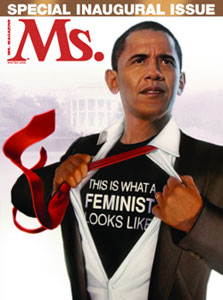
 First, thanks to Aviva over at Fourth Wave for posting a roundup of links to the Great Ms. Cover Debate of 2009 (“Super-Feminist Obama to the Rescue!“), and to Yondalla, who writes in reference to the image of Obama as Super-Feminist-Man in comments here at GWP, “A man who is a feminist would not be someone who would rescue us. It would be someone who walks beside us.”
First, thanks to Aviva over at Fourth Wave for posting a roundup of links to the Great Ms. Cover Debate of 2009 (“Super-Feminist Obama to the Rescue!“), and to Yondalla, who writes in reference to the image of Obama as Super-Feminist-Man in comments here at GWP, “A man who is a feminist would not be someone who would rescue us. It would be someone who walks beside us.”
Having read the critiques, I get it now. And I respect the dissent. But I stand behind my original praise of the cover. I agree with Jill over at Feministe, who writes,
“Obama has reportedly self-identified as a feminist, and has the legislative record to back it up. Is he a perfect feminist, or a perfect progressive? Not by any stretch of the imagination. Is he going to disappoint us over and over? Yeah, he’s already started. But he’s still pretty damned good, especially for a mainstream, center-left politician elected to the highest office, and I don’t really see the point in kicking him out of the club just yet.”
The brouhaha over this cover is not generational, nor is it necessarily PUMA-related (as Megan at Jezebel snarkily and dismissively asserts). The controversy is over the rescue narrative, and how one reads visual imagery, which is often more polyglot than it seems.
Looking at the current cover next to the famous 1973 cover featuring Wonder Woman, a bunch of questions come up for me. First, wasn’t this cover perhaps intended as satire? Because next to the cartoonish Wonder Woman cover, the current one certainly strikes me as having an element of fantasy to it too.
Second, Ms. is a magazine that has tried to reinvent itself over and over again. Its current readership skews older, and I imagine engaging younger readers is now key. In putting Obama on the cover in this way, are the publishers sending a message that the feminism of Ms. is big-tent enough to encompass younger Obama-supporting feminists? Was this a move to get beyond the stereotype of Ms. as “your mother’s magazine” that some younger women continue to hold? If so, I laud the extending of this generational olive branch.
In the end, I get the critiques about how men can’t save feminism. I really do. But bottom line over here: I like the playful, subversive idea that inside the most prominent man in the world right nows lies a feminist ready to more publicly engage. Time will tell whether or not it’s true.
(Paging Marco, my laid-off graphic designer husband who thinks a lot about superheros and blogs about the narratives behind images! Weigh in, my dear Clark Kent?!)


 First, thanks to Aviva over at Fourth Wave for posting a roundup of links to the Great Ms. Cover Debate of 2009 (“
First, thanks to Aviva over at Fourth Wave for posting a roundup of links to the Great Ms. Cover Debate of 2009 (“ Hells yeah! It’s high time we include worthy men in the visual iconography of feminism. The question of whether Pres-Elect Obama is such a man remains, fully, to be seen. But I’m banking that he is. And if he’s not, then I’m banking on Michelle and Hillary–and all the rest of us–to keep him in line. More than any president in our past, this man has got serious feminist potential.
Hells yeah! It’s high time we include worthy men in the visual iconography of feminism. The question of whether Pres-Elect Obama is such a man remains, fully, to be seen. But I’m banking that he is. And if he’s not, then I’m banking on Michelle and Hillary–and all the rest of us–to keep him in line. More than any president in our past, this man has got serious feminist potential. From time to time, we put your comments into posts. Here’s one I couldn’t pass up, from
From time to time, we put your comments into posts. Here’s one I couldn’t pass up, from 
 A few quick hits:
A few quick hits:

 In the midst of horrible headlines, a bright spot. As reported at
In the midst of horrible headlines, a bright spot. As reported at 